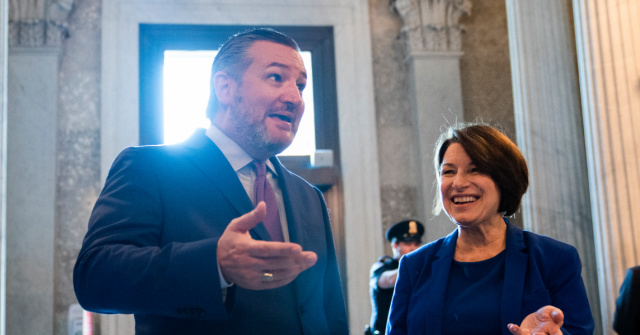

On September 8th at the Senate Judiciary Committee hearing on the JCPA, Senator Ted Cruz introduced a proposal which temporarily forced the Democrat co-sponsors to withdraw the bill.
If Sen. Cruz intended to expose Democrats’ pro-censorship motivations, he succeeded. But inexplicably, he has now agreed on a new amendment with Senator Amy Klobuchar that enables and facilitates the censorship he purports to oppose.
The core concept of the JCPA is to allow media companies to form a legal cartel in the U.S., for the sole purpose of negotiating with tech giants for special favors.
When Sen. Cruz successfully inserted an amendment into the derided media bailout bill limiting the scope of those negotiations to price, it exposed the pro-censorship motivations of the bill’s Democrat supporters.
Its lead sponsor, Sen. Amy Klobuchar (D-MN), preferred to withdraw the bill from consideration rather than limit the ability of a media cartel to demand Big Tech companies censor their competitors.
Inexplicably, conservative icon Cruz caved to Klobuchar in order to secure a back-room deal to facilitate the JCPA’s passage through committee without having solved any of the core structural censorship (or other) concerns with the bill. The deal is the type of D.C. swamp creature maneuvering that Cruz has berated Republicans for since joining the Senate.
In the process, Klobuchar revealed the JCPA was never about rescuing mythical small-town newspapers: it’s about cementing the power and influence of established media companies, while crushing their independent competitors on social media.
Even with the Cruz-Klobuchar amendment, the JCPA still enables censorship and shuts out the media’s competitors.
There are a variety of ways in which the bill, as it is currently written, allows the media cartel to exclude competitors from the benefits of negotiations with tech companies.
As previously reported, the bill empowers media companies to exclude members based on virtually any criteria.
Via Breitbart News:
Specifically, the new JCPA contains a provision that allows “eligible” media companies forming a cartel to “create admission criteria for membership unrelated to the size of an eligible digital journalism provider or the views expressed by its content, including criteria to limit membership to only eligible publishers or only eligible broadcasters.”
That provision is significant especially for its specificity. These mainstream and left-wing media cartels may not exclude based on size or “views expressed by its content.” But that is not how the exclusion happens or will happen.
These self-appointed mainstream and left-wing media cartels ARE allowed to exclude based on the usual, totally subjective, factors they always do, such as: “trustworthiness,” “fake news, “extremism,” “misinformation,” “hate speech,” “conspiracy,” “correction policy,” “expertise,” “authoritativeness,” etc.
While the Cruz-Klobuchar amendment may limit formal negotiations between the media cartel and Big Tech to price, there is no way to prevent the effects of the informal ties that will develop between the cartel’s representatives and companies like Google, Facebook, and Twitter. An already-corrupt relationship, in which Big Tech companies voluntarily devote billions of dollars to propping up the corporate media, will become more corrupt – something Senator Cruz knows.
Of course, the Cruz-Klobuchar amendment does not even attempt to address the myriad other anti-publisher and cartel-enabling provisions of the bill, such as the impossibly problematic arbitration and litigation provisions.
For example, the bill provides that a cartel may force a Big Tech company to an arbitration proceeding to determine pricing. But in any such proceeding, the Big Tech company will have the inherent advantage– possessing all the relevant algorithmic and competitive information, not to mention more money, resources, and lawyers to fight the arbitration with.
Big Tech will fight to disclose any financial or algorithmic data, and how are news media companies supposed to protect their own competitive and proprietary information and data from each other in such a proceeding? It’s an impossibility and a conundrum the sponsors of the JCPA are either blind to or don’t care about – no, they just want to ram a poorly conceived and structured bill through.
What’s the remedy for a news media company excluded from a cartel? Well, it can sue in federal district court to be included. Doing so will cost hundred of thousands if not millions of dollars and expose all kinds of confidential and proprietary data to one’s competitors.
It can’t be overstated the built-in deference to an excluded news media company to pursuing such a “remedy” – assuming for an instant it has the resources to even entertain doing so. After all, the whole alleged purpose
of the JCPA is to help financially crippled local news. It is sophistry to think that these financially crippled local news outlets would have the requisite money and resources to mount such fights.
It’s for these reasons that Senator Cruz’s actions represent such a betrayal. He and Senator Klobuchar both have presidential ambitions and they’re on full display here. Both will walk away from the JCPA table trumpeting the mantle of bipartisanship to push their own personal agendas. However, Main St. Americans will be left behind as usual, with even fewer sources to turn to for news that isn’t controlled by Big Tech censors. In fact, news media will only become more beholden to Big Tech if JCPA passes.
Allum Bokhari is the senior technology correspondent at Breitbart News. He is the author of #DELETED: Big Tech’s Battle to Erase the Trump Movement and Steal The Election.




